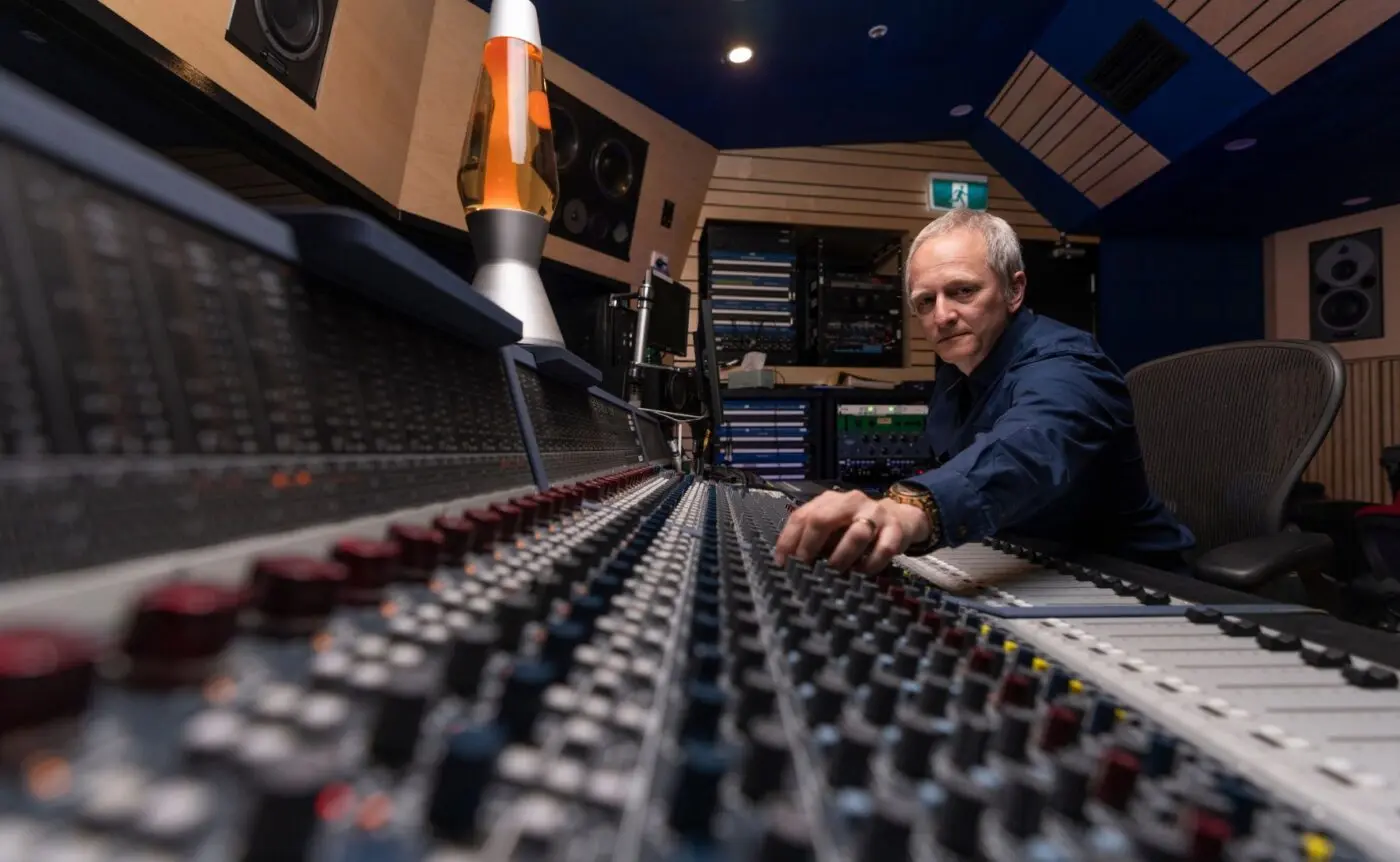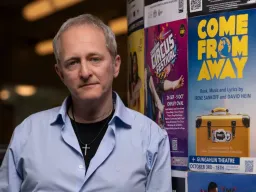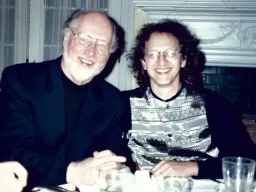A musical metamorphosis: Kenneth Lampl is mastering the art of reinvention

Professor Kenneth Lampl is constantly charting new ground. Photo: Jame Kidston/ANU
There’s no better gift for a budding musician than growing up in New Jersey – home to one of the world’s greatest jazz scenes.
Music was ever-present in childhood for ANU professor and composer, Kenneth Lampl.
“My parents played music all the time. When I was three, they bought me a little record player I couldn’t stop listening to,” he says.
By sixth grade, Lampl had already taught himself how to play the saxophone and spent his teens tooting through local jazz clubs, parades and jamming with friends.
A future in the arts seemed inevitable, but when he told his parents he wanted to study music the answer was blunt: no.
“It was the ’80s and there was no equivalent of HECS system. Parents had to pay for their kid’s education and mine refused to pay for music. That’s why I ended up studying biology,” he says.
Fate, however, had other plans.
“As the kid with no music lessons until university, getting a full scholarship in a place full of child prodigies was the proudest moment of my life.”
Professor Kenneth Lampl
In his first week at university, Lampl heard the thrum of a jazz band rehearsing as he crossed campus. He knew his sax chops weren’t up to par, but still mustered the nerve to ask for a chance to join in.
The band director – a man named Paul Jeffrey – sized him up and shouted: “What f***ing kind of sax player doesn’t carry his horn with him?”
Lampl bolted to his dorm room and returned with the woodwind instrument. His music career was about to take off.
“Jeffrey turned out to be a saxophone icon in the world of jazz who’d played with Thelonious Monk and Charles Mingus. He became my first music teacher and had such a profound impact on me,” Lampl says.
“He told me a thing that changed my life – that talent is nothing but time.”
And time, indeed, proved Jeffrey right. Four years of 10-hour practice days and late-night gigs across New York clubs hardened Lampl into a formidable musician, landing him a gig with the legendary jazz drummer Chico Hamilton.
With Hamilton, Lampl toured nationally, performing at world-renowned stages such as the Apollo Theater, Lincoln Center and the JVC Jazz Festival.
Little did he know, jazz was only the prelude to a life-long musical metamorphosis.
May the music be with you
Lampl’s promising jazz career took an odd turn when Richard Strauss’ music found him.
“When I heard the piece Death and Transfiguration for the first time at 21, my mind was absolutely blown. Jazz, which had been everything to me, suddenly became a small part of a larger universe which included classical music,” he says.
From that instant, all he could dream of was composing classical music. The problem? He had no composition portfolio and at his age it was considered too late to start.
But determination is in Lampl’s bones, and he threw himself into the work – so much so that in 1992 he became the only composer in the world accepted into the Juilliard School’s doctoral program.
“As the kid with no music lessons until university, getting a full scholarship in a place full of child prodigies was the proudest moment of my life,” Lampl says.
His career would only go up from there. And eventually came the moment all his passions intersected: studying composition with the legendary John Williams.
Lampl recalls vividly when the Star Wars composer broke down the score for one of cinema’s most suspenseful moments – the shark’s first appearance in Jaws.
“What came out of his mouth was the most profound thing I’d ever heard. He spoke about philosophy, psychology, literary criticism – everything I loved outside music. It was as if the heavens opened and the choir started singing. I knew I was home,” he says.
After that, yes, Lampl got his Star Wars score signed. But more importantly, he went on to write more than a hundred film scores himself – including 2067, Sissy, Frontera.
Today, he describes his sound as straddling two worlds.
“I grew up on the cusp of the old film score guard when everything was orchestral. But I also studied film-score mixing and I’m good with synthesisers. I often get hired because I can do both: the old school and the new.”
From the Pokéball to your Spotify playlist
In the late ’90s, Lampl received a call from a friend asking if he could cover a project she didn’t want: “Some kids’ movie… something called ‘Poke-man’ or so.”
He laughed. “Fine, I’ll do it as a favour,” he told her. “But you owe me one.”
That favour turned into scoring the first-ever Pokémon movie – an instant classic for a generation of ’90s kids.
“It was a collaborative effort,” he recalls. “They brought ten of us into the Pokémon office, handed us five to seven minutes of the film, and told us to deliver it by the next day.”
Like Pikachu and its fellow pocket monsters, Lampl has never shied away from evolution. Lately, this philosophy has taken him somewhere unexpected: the world of dark ambient music.
Under the moniker ‘No One Is Listening’, he’s racked up more than 100,000 monthly Spotify streams with moody, atmospheric tracks that could slip seamlessly into the soundtrack of Stranger Things.
“In classical music, to get a thousand total listens is a big deal. With dark ambient, I’m hitting 10,000 streams a day. It’s wild,” he says.
For Lampl, it’s not about chasing trends but chasing new adventures.
“At a certain age, it’s fun to start new journeys. I don’t know where this one leads, but I know I’ve hit something.”
Inspiring the next generation
As otherworldly as his life may seem, Lampl has called Canberra home since 2017.
Today, he teaches courses in film and video game composition as well as music technology at the ANU School of Music.
He is preparing students to be musicians of the 21st century.
“Everyone, whether composer or performer, has to play, write, mix, and work fluently with technology. The days of being just one thing are over,” he says.
Lampl encourages his students to hang out with their kindred spirits.
“Somehow, there’s an illusion that there’s something called the industry that will provide students with jobs when they complete their degrees. But it’s all about personal connections with people in the industry who share your passions,” he says.
“Talent is nothing without opportunity. The most important thing that young composers can do is to be meeting filmmakers and game developers of their own age with similar interests.
“Think about it, where would John Williams be without Steven Spielberg? It was Steven who suggested to George Lucas to use John for Star Wars.”
Outside the classroom, Lampl isn’t done charting his own path. He hints that his latest score was for a Hollywood heavyweight ‘everyone would know.’
It’s his favourite work to date. Stay tuned.
The The original article was published by the ANU Reporter and written by Luis Perez.

